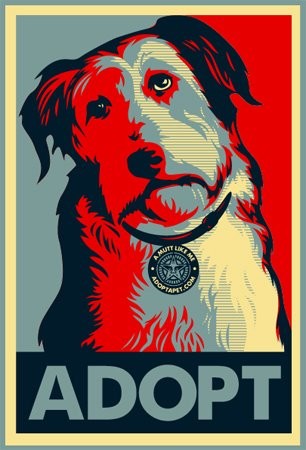I had to get some help. The shelter dog I was taking for a field trip downtown wasn’t interested in getting in my car and no amount of pleading and plying made a difference. I had to get a shelter staff member, someone the dog knew and trusted, to convince her that it was okay.
It had been almost five years since I’d driven with a dog in my car, and it took a while to get used to the paws inching toward my lap and the panting breath fogging up the windshield. Once we got to Beale Street, though, we were both a lot more comfortable. Lady, an infamous former resident of the cobblestones, seemed instantly to recognize her old stomping grounds, and I was just relieved to have made the trip with my car upholstery intact.

Our mission for the day was to mill around at the Mid-South Pride festival and pre-parade doings, making folks aware of the dogs available for adoption and socializing the animals in the meantime. My low-key rescue was no attention-match for the four-month-old border collie pup another volunteer had brought, but she still drew smiles and pats from the fluctuating crowd that gathered around our group.
That crowd was variable but steady, people drawn in ones, twos, and threes toward the dogs no matter where we were in Robert R. Church Park. Some came shyly and others stretched their hands out from yards away, but all left us with a smile. The dogs, all taken in from situations of abuse or illness or neglect, were sweet and playful, nosing for treats and flopping over for belly rubs on cue.
All of our pups got lots of love that day. One dog, however, seemed to have her own entourage. Every time I looked over, there were at least a few people hovering around a two-year-old Shepherd mix named Amber. She wasn’t the prettiest dog at the park; most of her left side was shaved to the skin, and large scars were visible in the bare patches. Without exception, everyone asked what had happened to her, and each time the volunteer at her side calmly replied, “She was set on fire.” Hearing those words, people gasped, cursed, or silently shook their heads, and then immediately reached to pet her, many kneeling in the wet grass to look in her eyes and talk to her, reassuring the damaged creature of her beauty and strength.
Maybe this happens wherever Amber goes. This was our first outing together, so I can’t say for sure. But it felt especially powerful at that time, in that place. I could feel not just the outrage among the people who heard her story, but also the empathy. Here was an innocent living being, made to suffer for no reason but the ignorance and cruelty of another. She went through unimaginable pain, and yet she survived. Not only survived, but retained her capacity to play and love and thrive. Her head was up, her eyes were bright. No matter what she went through, Amber had kept her pride.
We left that day as the parade was about to begin, wanting to keep the dogs calm and out of the noise and crowds. The festivities were threatened by heavy clouds rolling over the bridge from Arkansas, but we were the only group on the street moving away from the route rather than toward it. People had come from three states to be in, or be witness to, Memphis’ ever-growing recognition of and tribute to our LGBT community. A little rain clearly wasn’t going to dampen that.
When we got back to the parking garage, Lady still didn’t want to get in my car, but she relented more easily. She spent the ride back to her home curled up in my front passenger seat, listening nonjudgmentally to my radio duets and traffic muttering.
I know where Lady was found, but I don’t know her whole history. I don’t know how she was treated or what makes her so wary. All I know is that she has come through it and, like Amber and the other rescues we took out that day, is still a worthy companion. Like most rescued animals, her personality seems to convey a simple message, one I felt echoed all around me that rainy Saturday afternoon: Love is the best thing. Honor it wherever it’s found.